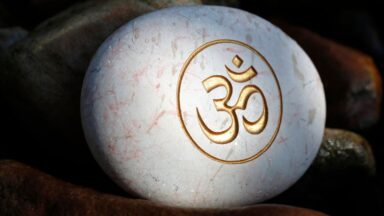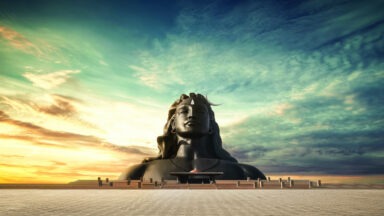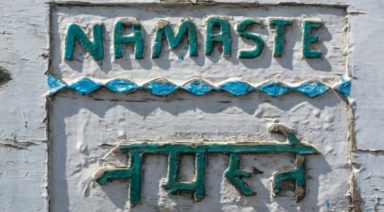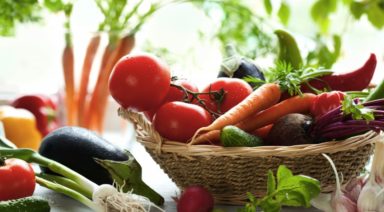What Your Dosha Type Means for Your Diet

Ayurveda is Sanskrit for “the wisdom of life.” Ayurveda originated in India and pre-dates modern medicine by thousands of years.
Ayurveda healing differs from modern medicine in the following ways:
- Focuses on preventative techniques, instead of merely reacting to illness as it arises
- Diet and habits are more strongly considered when diagnosing and treating
- Emphasizes on the uniqueness of the individual and finding what works for you personally
Three Types of Ayurveda Doshas
There are three types of Ayurveda Doshas – kapha, pitta, and vata. Doshas are more commonly known as mind-body types and are derived from the five elements.
While we all have aspects of each of the three doshas, for most of us, there is one dosha that dominates. You can also be a combination of two doshas, but that is less frequent. Before you learn about the characteristics of each type of dosha, determine which one(s) are most pertinent to you by taking this quick quiz.
I took this quiz with a little bit of healthy skepticism, not expecting anyone dosha to be that much stronger than the others, but for me, the traits corresponding to vata dosha are twice as strong. There are several dosha quizzes online, all of which gave me similar results.
Once you determine which dosha pertains to you, read about the strengths and weaknesses of that dosha and what dietary changes you can make to keep yourself in better alignment. While this article focuses on dietary modifications, there are all sorts of supplements, lifestyle and yoga practices that are also beneficial.
Doshas: States of Being
- Balanced – This is when all three doshas are present in a proportional way. It is important to note that balanced doshas look different for each person
- Decreased – In this instance, the presence of one or two doshas is reduced.
- Increased – When a given dosha is overly present in a body, it needs to be realigned, often by using the medicine of opposites
The Medicine of Opposites
Similar to other types of Eastern medicine, Ayurveda healing is about balance and alignment. In order to stay balanced, counter your natural dosha inclinations with foods, lifestyle habits, and exercise that are the polar opposite. For instance, for the stable kapha dosha, add some adventure and movement to your life. This type flourishes in dry climates and can handle both hot and cold. For the anxious, changeable vata dosha practice gentle, restorative yoga or calming mediation. In addition, vatas perform best in warmer climates. Lastly, for the fiery pitta dosha, eat cool, refreshing foods like cucumbers and apples and avoid hot, spicy foods. Moreover, pitta types flourish in cooler climates and are likely to excel in winter sports like skiing and hockey.
Vata Constitutions
The primary function of the vata dosha is movement and is related to the elements of air and space.
- Physical traits include: susceptible to cold temperatures, light bodyweight, and dry skin
- Personality traits include: creative, moving, quick, energetic and changeable
When balanced, vata types are high-energy and adventurous. They are prone to being creative and flexible. They tend to take initiative and are very active. They enjoy being warm and need lots of human contacts, both emotionally and physically. Each dosha type responds to and receives energy differently. Individuals with strong vata dosha get their energy in bursts, which means they are also prone to bouts of fatigue.
When unbalanced, they can suffer from insomnia, anxiety, and digestive issues. They can be spacey. They are also likely to blame themselves when things go wrong. An overactive mind is one of the greatest challenges for this dosha type, which can lead to anxiety-related health issues or insomnia. For a vata, these issues compound upon each other and will continue to make things worse until tangible steps are taken to realign your habits. Mediation, sticking to regular mealtimes, and getting at least eight hours of sleep are all helpful ways to get back on track. Routines are often the key for those that lean more vata.
If your vata dosha is increased, try adjusting your dietary patterns:
- Eat food combinations that are salty and sweet; avoid foods that are bitter
- Season your food with warming spices such as nutmeg, cinnamon, allspice and ginger
- Enjoy a warm cup of decaffeinated tea before bedtime, but avoid cold drinks
- Minimize caffeine and nicotine intake
- Avoid eating too much-processed food such as chips, cereals, and frozen meals
Pitta Constitutions
The primary function of the pitta dosha is transformation and corresponds to the elements of fire and water.
- Physical traits include: hot-bodied, medium build, and oily skin
- Personality traits include: intense, sharp, outspoken, intelligent, and fiery
When balanced, pitta types are fiery and energetic. They sleep soundly for short periods of time and have a strong sex drive. They also have good digestion. They tend to be are very intelligent, completive and incredibly driven. When they have control over their temper, they make strong leaders.
When unbalanced, they can struggle with heartburn, ulcers, and rashes. Also, since they have very good digestion, they can over-eat, which can lead to indigestion or weight issues. They also struggle with short-tempers and an inability to control their anger. Increased levels of pitta dosha can lead to inflammation in the body and rising emotional tensions.
If your pitta dosha is in excess, try adjusting your dietary patterns:
- Avoid spicy foods and acidic foods like citrus
- Minimize alcohol and caffeinated beverages
- Eat more cooling foods like cucumbers and sweet foods like melons. These foods are beneficial because they include large amounts of water
- Do not skip meals. If you get too hungry, you will quickly become hangry
- Drink a cold glass of milk, which is especially beneficial to the fiery pitta
Kapha Constitutions
The primary function of this dosha is stability and is related to the earth and water elements.
- Physical traits include: good physical stamina, sluggish digestion and circulation, great sleepers, soft eyes, and good skin
- Personality traits include: loyal, stable, reliable, loving and nonjudgmental
When balanced, kapha types are gentle, kind and compassionate. They are self-sufficient and loyal to their friends and family. They are not easily upset, undemanding and tend not to hold onto negative things. They are often stable person in romantic relationships or even friendships, in part because they are nonjudgmental and accept all types of people. They are happiest when they are out enjoying new experiences.
When unbalanced, they can be sluggish and lean towards depression. They are also susceptible to sinus conditions and respiratory problems, like asthma and allergies. They also tend to struggle to get up early. Their inclination to be overly sentimental can get them into trouble as they get attached easily.
If your kapha dosha is in excess, try adjusting your dietary patterns:
- Add garlic and ginger to your food to increase digestion
- Cook with lots of spices including cumin, chili, and peppers
- Minimize salt intake and sour foods such as vinegar or grapes
- Replace honey for sugar to increase your immunities and help with sinus troubles
- Avoid red meat, deep-fried foods, and carbonated beverages
- Eat meals hot whenever possible
- Also, exercise does not come naturally to this dosha, but is very important
Beyond Dosha-Inspired Diets
Dosha imbalances generally begin with an internal feeling of, “something is not quite right,” but can progress all the way to emotional distress or even a medical illness or condition. Focus on trying to get your doshas back on track by taking note of your imbalances, following the dietary suggestions, and experimenting with yoga practices suggested for the particular dosha which is misaligned. In fact, there are videos focused on each type of dosha – vata flow, pitta flow, and kapha flow. If this article has piqued your interest, there is a lot of information on doshas and Ayurveda healing out there, as well as practitioners that specialize in Ayurveda.
Dinacharya: Your Daily Yogic Routine

Translating to “knowledge of life” in Sanskrit, Ayurveda is the 5,000 year old sister science of yoga that assists practitioners in leading their lives by way of intuitive rituals. In adhering to one’s specific needs, those utilizing the practice of Ayurveda fall into rhythm with the seasons of self, emulating Mother Nature’s transitions and revelations in spring, summer, fall, and winter.
The Ayurveda practice of dinacharya, or “law of nature,” consists of daily self-care routines, which provide structure for instilling balance and establishing cohesiveness in the physical, mental, and emotional bodies.
The Doshas
Dinacharya is based on the philosophy that human beings run on a biological clock dictated by the patterns of the sun and the moon; different times of day adhere to different types of energy. These energies, known as doshas, connect the body and the mind in functionality. Three doshas exist: vata, kapha, and pitta; each dosha is associated with elements found in nature.
Vata
The first and early waking hours of the day 2am to 6am, and their afternoon inverse 2pm to 6pm, are identified as vata, which is associated with the elements of air and ether, or a sense of lightness. Movement is incredibly important at these times, as they are both transitional periods. In the early hours of the morning, it is believed that sleep and dreams are most active and that we are most receptive to thought; in the afternoon, many experience the need to mobilize to reenergize, sparking creativity.
Kapha
From 6am to 10am and 6pm to 10pm, it is said our kapha energy governs the manner in which we show up in the world. Kapha works in relation with earth and water, countering vata’s airiness with a sense of grounding.
Pitta
Pitta energy runs its course through our systems during the hours of 10am to 2pm, and 10pm to 2am. Related to fire and water, waking pitta hours are correlated with high productivity. During the wee hours of the evening, typically the mind is resting, but the internal organs are vigorously cleansing the body, preparing us for the next day to come.
A Path to Balance
When the body and mind are in balance with these cycles, we experience a sense of contentment in all areas of our lives. As represented by the changes in even a matter of hours, the human condition is not static. It is not uncommon for one of the doshas to dominate at different points in time, regardless of where the dosha cycles suggest we should be landing on the energetic spectrum. We do not remain in a place of equanimity without putting forth awareness and effort, but it is possible to achieve balance through establishing a dinacharya routine.
Dinacharya practices help to establish congruence in our vata, kapha, and pitta energies.
When instability encroaches into our energetic cyclicality, we may feel noticeably “off” and over time, unbalanced physical, mental, and emotional bodies breed disease and dis-ease. Benefits of dinacharya can be experienced almost immediately, and can serve vitality for decades when adhered to properly.
Components of dinacharya can be incorporated into virtually any time of day, and can be quite extensive; according to Aryuvedic Physician Vasant Lad, there are nineteen steps composing a proper morning awakening of the physical and mental bodies alone. Many traditional dinacharya practices applicable to specific hours of the day can be adapted and become inputs to forming a consistent self-ritual.
Wake Before the Sun
This vata time of day is believed to be one of quiet connection. Once the sun is in the sky, the clock of Ayurveda ticks to kapha, signaling it is time to move and be productive. Waking earlier than you usually may begin the day offers a chance to connect energetically with self, rather than your inbox first thing.
Meditation
Because the morning boasts fresh energy and serenity, this segment of the day has the potential to serve as an undistracted platform for meditation. Perhaps your sit consists of a few quiet moments, or maybe lasts a bit longer. Returning to a mindfulness practice at the end of the day allows for you to come full circle with your day’s experience, and is effective in supporting more restful sleep.
Movement
Finding time to be active throughout the day is important for maintaining balance and focus, as well as setting the stage for fulfilling the day’s requirements with ample energy.
In the morning, support the waking of your body in a way you enjoy, whether it be taking a brisk walk around your neighborhood, working with kriya, hitting the mat for Pilates, or devoting time to your yoga practice to energize or unfold slowly.
The afternoon is a prime time to get the blood flowing. After your largest meal of the day is consumed at lunchtime, give yourself at least 10-15 minutes for a walk or afternoon stretch to promote blood flow, ensuring the body and mind stay fired and inspired. Evening calls for gentler movement, such as a yin yoga practice, so that sleep may be gracefully eased in to.
Oil Pulling
This practice has been an aspect of dinacharya for thousands of years, and involves swooshing oil, such as sunflower or sesame, around your gums and teeth for 15-20 minutes each day, typically in the morning. Oil pulling is effective in removing toxins and parasites, which reside in the nooks and crannies between teeth, around the tongue, and in the gums.
These organisms not only affect the outer appearance of our pearly whites, but are often the root of inflammation and infection occurring throughout the body.
To reap the benefits of a brighter smile, clearer sinuses and skin, and healthier immune system, simply drink a glass of water upon waking, melt 1-3 tablespoons of an oil of your choice either on the stove or in your mouth, gargle for 20 minutes (this can be done while preparing breakfast or lunch, reading emails, etc.), spit, and rinse with water.
Self-Massage
Known as Abhyanga in Ayurveda, self-massaging is often practiced as a component of dinacharya in either or both the morning and the evening. According to Sandhiya Ramaswamy, regarded Ayurvedic chef and educator, abhyanga, when performed daily, enhances balance in the energy bodies and overall longevity, calms the nervous system, softens skin, and tones muscle, amongst other benefits. Using warm oil, start at your scalp and work your way down the body using your fingertips and palms. Once applied, allow for the oil to marinate into your skin for five to ten minutes, and follow with a warm bath or shower.
Skin Brushing
This Ayurvedic technique requires a very small time investment, but pays greatly in its dividends. Using silk gloves or a dry skin brush, start at the feet and work your way up to the crown of your head. According to Dr. John Doulliard, director of LifeSpa.com, a leading resource in Ayurvedic wellness, brushing toward the direction of your heart drains the lymphatic system, and can help the body move waste more quickly and stimulate the burning of fat. This technique can be practiced preceding self-massage for added benefit.
Nourish Properly
Morning and evening meals should be light in comparison to your lunchtime consumption. Afternoon is the time of day most appropriate for intake of your heaviest meal, for several reasons. The digestive system has fully awakened, and the body has ample time to break down what has been consumed without interrupting your awakening or your sleep cycle. Agni, or digestive energy, is in full force; in order to keep the fire roaring, it is necessary to fuel adequately.
According to Monica Bloom, author of “In Your Elements: A Blooming Ayurvedic Guide to Creating Your Best Life,” a warm, vegetable-filled plate should be consumed at this time. Acknowledging this may not be ideal for meals eaten at work in terms of preparation, Monica suggests preparing a large batch of healthful dishes at night, eating a small portion for dinner, and bringing the majority on the go with you the next day to save both time and hunger pangs.
Head to Bed Early
It is recommended to begin your evening ritual around 8:30pm to ensure a restful transition into your evening rest. Unwinding with a book or a bath serves as a palate cleanser between the busyness of the day and the tranquility of bedtime. Establishing an early bedtime initiative for your self can also prevent late-night, metabolism-hindering snacking; around 10pm, pitta energy kicks back in which, when awake can spark hunger, when resting allows for full-body restoration.
The above are only a select few options on the full menu of dinacharya offerings. Taste one, taste all offerings; Director of Ayurveda Programs at Shankara Ayurveda Spa Medha Garud notes that the adoption of two dinacharya-inspired changes can make a difference when enveloped into your day-to-day routine. The implementation of a personal dinacharya ritual can serve as powerful and effective insurance for physical, mental, and emotional congruence and observance.





































